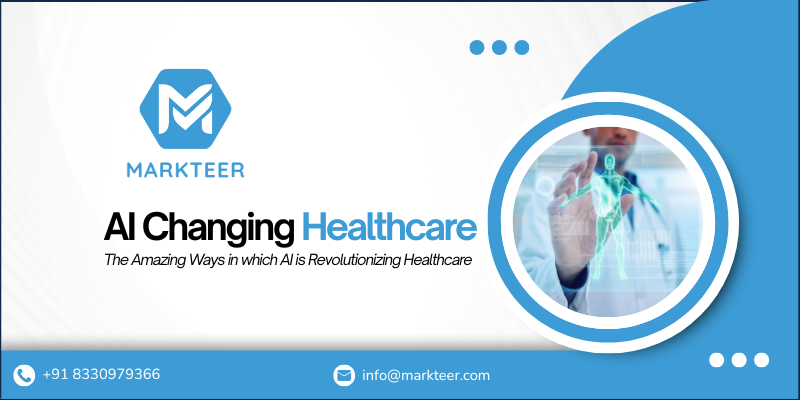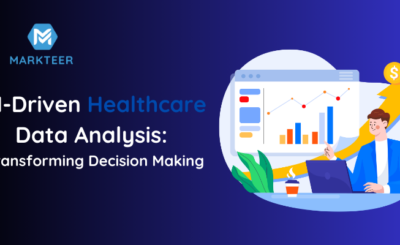Artificial intelligence, more commonly known as AI, has transformed so many industries in recent years that it can often become challenging to keep up with all the progress. However, many may be unaware of how much AI has advanced the healthcare industry. Through advanced data analysis, AI has enhanced both diagnostics and surgical precision and upgraded patient care.
The global market for AI in healthcare was estimated to be valued at $2.4 billion in 2019 before AI seriously proved its worth during the COVID-19 pandemic. During that time, AI tracked the virus, countered misinformation, and even expedited the development of a viable vaccine. With a now proven track record in the healthcare niche, experts predict that the growing technology will likely reach a value of $31.02 billion by 2025.
Importance of Healthcare Innovation
Continuing innovation in healthcare is vital to maintaining a viable and content society. It is more critical than any other industry since everything suffers when human health is at stake. Overcoming modern-day healthcare challenges by using the quadruple aim of improving the population’s health, providing pleasant experiences for patients and caregivers, and reducing overall costs is crucial.
That said, with the burden of the aging Baby Boom generation, chronic diseases, and ever-escalating expenses, healthcare delivery systems are becoming far overtaxed, and any method that can ease tensions and transform care is more than welcome in today’s society. The COVID-19 pandemic exacerbated these contentious issues, often revealing care inequities and severe workforce shortages.
Fortunately, AI assists healthcare providers in balancing the delivery of high-quality care by adopting scalable solutions that integrate real-world data, such as genomics and demographics.
Role of AI in Diagnosis
AI continues to mesmerize the medical community due to its revolution of diagnostics. Its analysis of raw healthcare data has led to faster and more precise diagnoses, leading to much better patient outcomes than in generations past. Healthcare AI enhances the accuracy of diagnoses and supports professionals in making informed and timely decisions by integrating clinical workflows with machine learning algorithms. It is not a replacement for a physician’s expertise but rather a complement to it, detecting subtle patterns in data that may elude even the most observant human beings. By analyzing such extensive datasets, including lab results and medical histories, AI can predict diagnoses, such as heart disease or dementia, where early intervention is key to securing the best outcomes.
Another advantage of using AI as a diagnostic tool is its amazing applications in modern medical imaging. Its advanced algorithms can analyze CT scans, MRIs, and X-rays to detect abnormalities, such as fractures or tumors, with remarkable accuracy. This saves patients from diagnostic errors that can stall the facilitation of imperative treatment. And, though AI can be a lifesaver, detecting cancer earlier than ever, it can also be used in everyday applications, such as ophthalmology, and eye ailments such as glaucoma.
AI in Surgical Experience
AI has enhanced many surgical procedures with its heightened precision, more significant safety measures, and increased efficiency. While surgeons are undoubtedly highly skilled, adding AI technology to routine and complex surgeries can reduce the chance of human error, improving post-operation patient outcomes. In fact, robotic arms guided by AI are nearly unmatched in control and help provide minimally invasive procedures that are over quickly, far less painful, and yield shorter recovery times.
In addition to these breakthroughs, AI assists in preoperative strategizing by simulating complex scenarios. Many times, this is achieved by using AI-powered 3D anatomical models. This aids surgeons in anticipating any possible challenges, such as bleeding risks, before surgery begins. Once the operation is underway, AI excels in providing real-time guidance by using augmented reality overlays to identify anatomical structures and utilizing blood flow analysis to stave off potential complications.
Also Read: How Does Hospital Digital Branding Influence Online Success
Enhancing Treatment and Personalized Medicine
Amazingly, AI is also taking the field of personalized medicine by storm by creating tailored treatment plans for patients that take unique genetic, lifestyle, and environmental factors into account. This type of treatment, based exclusively on individual patients’ data, ensures much more thorough care, improving the effectiveness of therapies, including medicine and surgeries. It also minimizes any adverse effects by predicting such outcomes in advance. This is just another way in which AI is continuing to shift healthcare toward a more patient-centered model.
In addition to these breakthroughs, AI enhances medicine in more straightforward ways that many can appreciate but often take for granted. AI-powered devices now work as patient monitors, tracking vital signs and medication compliance and enabling dynamic adjustments to treatment plans. The technology even promotes patient cooperation with treatment plans by providing accessible health information and tools, allowing patients to monitor their progress.
Improving Patient and Doctor Experience
Virtual healthcare assistants and predictive analytics have aided physicians in anticipating patient needs and meeting them faster and better than ever before. Healthcare providers can also benefit from AI use through automated documentation, assistance with medical imaging interpretation, and clinical decision support. AI’s predictive analytics even identify high-risk patients through thorough medical data analysis. Also, AI automates tedious administrative tasks, and streamlining clinical workflows is essential to timely care delivery.
Regarding patients’ experiences, AI chatbots offer medical appointment reminders, instant access to information, and support as needed. AI technologies can also provide remote monitoring, tailored treatment plans, and improved access to telehealth services if necessary. Patients can even utilize virtual assistants to obtain continuous support for chronic conditions, enhancing satisfaction and engagement. This is especially true in rural or underserved areas of the population.
AI Chatbots to Assist Patients/Attenders
AI chatbots are nothing new in terms of basic customer service. However, they play a vital role in supporting patients and their families through the administrative tasks that once buried the sick in mountains of bureaucratic paperwork. They can also provide patients with critical information 24 hours a day. Some chatbots even assist with triage duties for urgent care needs, give symptom assessments, provide medication reminders, schedule appointments, record new patient data, and offer mental health support.
Also Read: Effective Marketing Strategies for Conversion Optimization
Improving Operational Efficiency in Healthcare
Regarding efficiency, AI improves daily operations in healthcare by optimizing monotonous tasks like scheduling, resource allocation, and inventory management. AI systems can predict patient appointment peaks so clinics can ensure adequate staffing and reduce wait times. The technology can also handle both data analysis and administrative tasks, allowing healthcare providers more time to focus solely on patient care, where they are most needed. Implementing AI-driven tools can improve resource utilization, simplify workflows, and reduce operational costs.
Addressing Challenges and Ethical Considerations
While the adoption of AI in healthcare certainly offers significant benefits to the industry, one must, however, play devil’s advocate and address some of its shortcomings. The technology does raise challenges regarding algorithmic bias, regulatory compliance, and the privacy of data to monitor. If healthcare professionals ensure transparency and ethically use AI, they should easily retain the trust that their patients already have in them. The concern, of course, lies in the copious amounts of data that AI heavily relies on. Privacy, data security, and informed consent must all be protected.
Third-party vendors are involved in developing and integrating AI systems; their specialized expertise is necessary. However, their involvement increases the risk to patient data privacy. Clinics must require security contracts, thorough oversight, and robust encryption to protect sensitive information.
Also Read: Scaling Influencer Marketing for B2B Companies
Future of AI in Healthcare
Integrating AI tools within the healthcare field holds great promise. AI has accelerated research techniques and can identify potential treatments faster, leading to more efficient drug discoveries. Wearable AI-driven technology can provide a real-time health monitor, empowering patients and providers with valuable insights and opportunities for earlier interventions.
Additionally, AI is now being integrated with other emerging technologies, such as blockchain technology, which enhances data security and securely manages and protects patient information. With the Internet of Things (IoT), AI can seamlessly connect between devices, allowing continuous data collection and analysis.
Final thoughts
AI-driven tools are transforming healthcare policy in various ways. They have been proven to enhance diagnostics, optimize operational efficiency, and improve the accuracy of both diagnostics and surgery. Virtual health assistants, predictive analytics, and automated workflows have allowed healthcare systems to become much more patient-focused, as they should be. And, despite some minute challenges concerning ethics, data privacy, and regulatory compliance, the benefits of AI in healthcare far outweigh any concerns.

